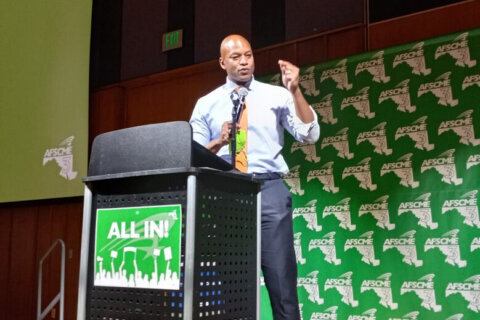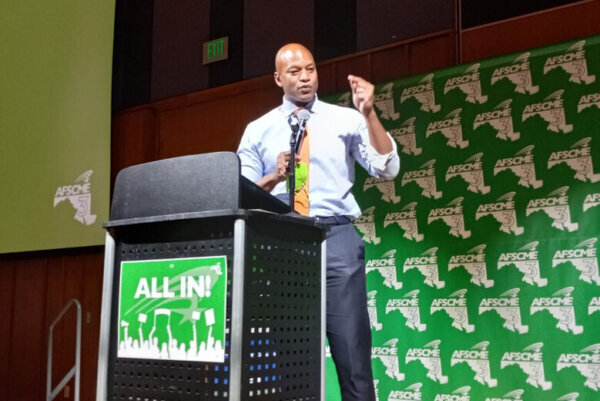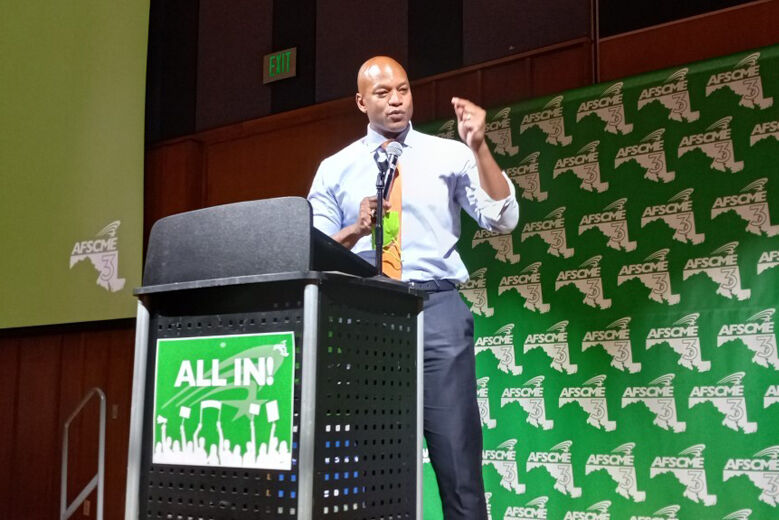This article was republished with permission from WTOP’s news partners at Maryland Matters. Sign up for Maryland Matters’ free email subscription today.

This content was republished with permission from WTOP’s news partners at Maryland Matters. Sign up for Maryland Matters’ free email subscription today.
Wes Moore was given a hero’s welcome at the annual Maryland AFSCME convention in Silver Spring this week.
The 200 assembled delegates from around the state, who all work for state for local governments, roared and leapt to their feet when Moore was introduced, and cheered lustily throughout his 25-minute speech. They rushed for hugs and selfies when he was done.
Moore was equally enthusiastic. He hugged AFSCME Council 3 President Patrick Moran and called him “my brother.” He hugged Donna Edwards, a former AF
SCME local president who is now president of the Maryland State and D.C. State AFL-CIO. And he told the delegates just about everything they wanted to hear.

“There is never a doubt on where you stand and who you stand for,” Moore said, to more cheers. “I can’t wait to be your partner in this work. We are going to stand arm in arm.”
It was hard to believe that just a few months earlier, AFSCME, the AFL-CIO and several other labor groups were spending hundreds of thousands of dollars to defeat Moore in the summertime Democratic primary.
Most Maryland unions, with some notable exceptions, endorsed former U.S. Labor secretary Tom Perez for governor over Moore and eight other Democrats. In a brief interview after his speech Tuesday, Moore dismissed the idea that there might be any hard feelings.
“I love being here,” he said. “This is family.”
Moore said he comes from a union family and that speaking to rank-and-file workers is “one of the things I love most” about being on the campaign trail. Whenever he goes to a union gathering, he noted, he almost always runs into a relative.
“To have the support of so many unions is very meaningful,” Moore said.
Not surprisingly, the unions that did not endorse Moore in the Democratic primary have moved swiftly to back him in the general election against state Del. Dan Cox (R-Frederick). And the endorsements keep coming. Just this week, the Laborers’ International Union of North America, which backed state Comptroller Peter Franchot for governor in the Democratic primary, came on board.
“Wes Moore lives up to his last name because he is all about making sure that Maryland’s working families achieve more,” said Dennis Martire, LIUNA vice president and Mid-Atlantic regional manager. “More wages, more benefits, and more protections.”
At the AFSCME convention at the Silver Spring Civic Center this week, union members were handed yard signs and lapel stickers that said “All in for Moore,” and it was hard during his appearance there to think that anyone would be anything but that.
“We need to make informed, smart decisions and we have made that informed, smart decision [to back Moore]. But we have to act on it,” Moran exhorted his membership.
Moore and his running mate, former state Del. Aruna Miller (D-Montgomery), gave full-throated populist speeches that any union member would love, about the dignity of work and the important role that unions played in establishing the middle class. Both candidates talked about their own humble beginnings, and Miller said Moore’s perspective and life view would be good for workers.
“An underdog is always going to look out for another underdog,” she said.
And Moore vowed to help rebuild the state workforce, which has been reduced dramatically under Republican Gov. Larry Hogan, praising government employees for working hard during the pandemic and thriving even when their agencies were “amazingly understaffed.”
“You are not alone,” Moore assured them.
For AFSCME members, who have observed frosty relations for the past eight years between union leaders and Hogan, Moore’s promises of partnership must have been a balm.
“We look forward to building a strong relationship with his administration to overcome the shortcoming of the last eight years and overcome the hardships that their workers have been asked to endure,” Moran said in an interview.
Even so, there is speculation in Annapolis that some unions that backed Perez in the primary — or at least some of their leaders — will be looked on less favorably by Moore and others in his administration if he wins than, say, the leaders of the Maryland State Education Association, which delivered a critical endorsement of Moore three months before the primary and the few small building trades unions that also backed him in the primary. Already there is gossip about a snub here or a curt conversation there.
On the other hand, the unions are, as the AFSCME swag suggests, all in for Moore, because the alternative — Cox — is unpalatable to them. And for Moore, unions are an essential part of the Democratic coalition, and if they turn out strong, will help solidify his expected victory in November.
“I haven’t heard of any bad blood” between the unions and Moore, said state Sen. Paul Pinsky (D-Prince George’s), a former activist and organizer with the teachers’ union who backed Moore in the primary. Pinsky posited that many unions got behind Perez in the primary because they knew him better than Moore, from his time in the Obama administration and as Maryland’s Labor secretary under former Gov. Martin O’Malley (D).
Perez, Pinsky said, “has a record. He actually came close [in the primary] and was closing the gap. Look, people take sides. It’s a primary. You pick who you want. There’s no guarantee. People had questions about what kind of path Wes is going to take because Wes is new to governing. But now the primary’s over and you come together.”
Adam Pagnucco, a Montgomery County-based political strategist and commentator who spent 15 years working for building trades unions in Washington, D.C., said Moore and organized labor have many reasons to stay aligned.
“My hunch is, other than the teachers, the unions picked Perez because they were comfortable with him. It was natural,” he said. “Now that Perez is out of the picture, they still have their policy agenda. They still need to get things done in Annapolis.”
Moore and his lieutenants, Pagnucco predicted, will probably take some time figuring out which union leaders they’ll want to work most closely with if they wind up running the government, but they are almost certain to determine that labor peace is a good thing for a Democratic governor and can help forestall an intra-party challenge four years from now.
“The two sides have every reason to work together and I expect they will,” he said.
Moran said there was zero hesitation about moving quickly to back Moore as soon as the primary was over.
“Those people won, and we’re getting behind people who we believe are going to move the state forward,” he said.








